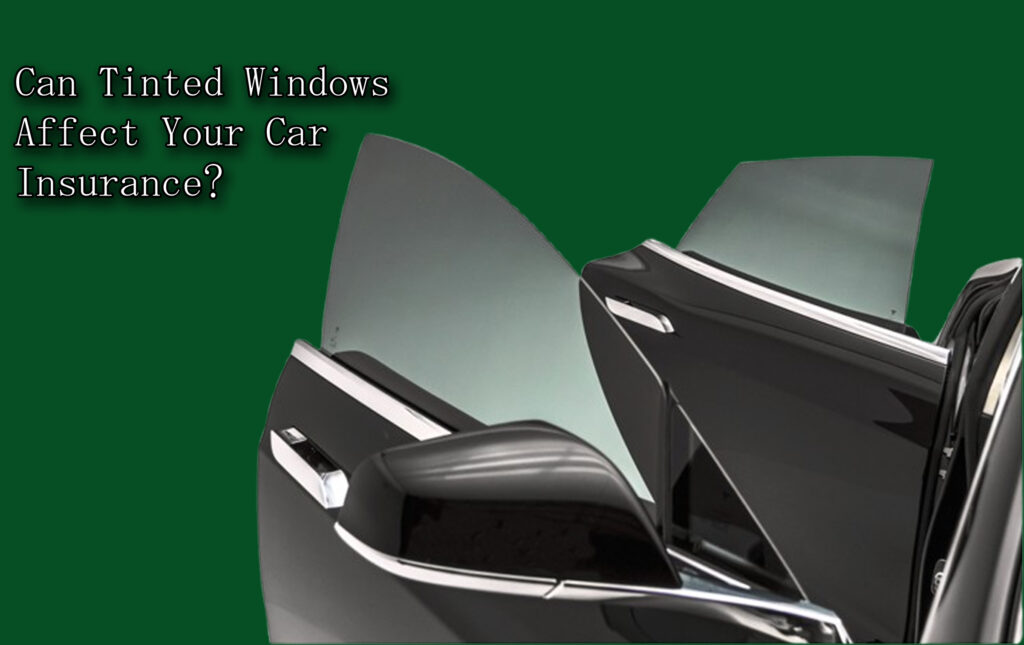Can tinted windows affect your car insurance? A lot of drivers choose tinted windows for their cars, not just for the cool look, but also to block sunlight and add some privacy.

But have you ever wondered if tinting your windows could affect your car insurance? It’s a fair question, and the answer isn’t always simple.
In some cases, your window tint might not matter at all. In others, it could lead to issues with your insurance company or even cause trouble during a claim.
However, in this article, we’ll break down all you need to know about if tinted windows can affect your car insurance. So, you know what to expect before or after tinting your car windows.
Do Tinted Windows Raise Your Insurance Rates?
In most cases, simply adding window tint won’t automatically raise your insurance rate. Insurance companies mainly look at things like your driving history, your car’s value, your location, and how likely you are to make a claim. A legal window tint usually doesn’t change any of that.
However, if your tint is too dark or goes against your state’s laws, it might be a different story. An illegal tint could raise red flags during a claim or even lead to fines or tickets, which could end up affecting your premiums in the future.
Why Insurance Companies Might Care
Insurance companies don’t mind legal tints, but they do care about things that can increase risk. Here’s why tinted windows might matter to them:
- Reduced Visibility: Very dark tints, especially on the front windows, can make it hard to see the road, especially at night. This could raise your chance of getting into an accident.
- Obstruction to Police or Emergency Workers: Dark windows might make it hard for others to see inside your car, which can be a safety concern during traffic stops or accidents.
- Claim Denials: If you file a claim after an accident and your car has illegal tint, your insurance company might question your coverage or even refuse part of the claim.
So while the tint itself may not raise your rate, the consequences of illegal or extreme tinting might lead to issues that do.
Legal Tint vs. Illegal Tint
Every state (and some countries) has its own laws on how dark you can tint your windows. Some states allow darker tints on rear windows but not on the front. Others don’t allow tint on the windshield at all, except for a small strip at the top.
If you tint your windows without checking your local laws, you could get fined or be forced to remove the tint. And if you keep the tint anyway, it could show up on your driving record, which your insurance company might notice.
Tip: Before getting your windows tinted, check with your local DMV or a trusted auto shop that knows the rules in your area.
How to Stay Safe (and Insured)
If you want to enjoy tinted windows and keep your insurance in good standing, here are a few smart steps:
- Know the Laws in Your State: Each state has different limits on window tint. Stay within the legal range to avoid trouble.
- Tell Your Insurance Company (if required): Some companies ask about car modifications, even small ones. It’s better to be open and honest so your policy stays valid.
- Keep Tint Installation Records: If you get your tint done professionally, ask for a receipt and a copy of the tint specs. You may need this if questions come up later.
- Avoid DIY Tint Kits (if unsure): These might not meet legal standards and can be harder to apply correctly. A professional installer will usually follow the rules.
Final Thoughts
Tinted windows can be a great upgrade for comfort, privacy, and looks. And in most cases, they won’t mess with your car insurance as long as they’re legal. The real problems come when the tint is too dark or doesn’t follow the rules where you live.
To stay safe, avoid fines, and keep your insurance smooth, it’s best to follow local laws and let your insurance company know about any changes you make to your car.



